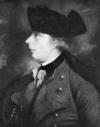- Wolfe, James
-
born Jan. 2, 1727, Westerham, Kent, Eng.died Sept. 13, 1759, QuebecBritish army commander.After a distinguished military career in Europe, in 1758 he helped lead Gen. Jeffery Amherst's successful expedition against the French on Cape Breton Island. In 1759 he was appointed commander of the British army on its mission to capture Quebec from the French. In the ensuing Battle of Quebec, he defeated the French in a battle lasting less than an hour. Wounded twice early in the battle, he died of a third wound, but not before he knew Quebec had fallen to his troops.
 James Wolfe, painting attributed to J.S.C. Schaak; in the National Portrait Gallery, LondonBy courtesy of the National Portrait Gallery, London
James Wolfe, painting attributed to J.S.C. Schaak; in the National Portrait Gallery, LondonBy courtesy of the National Portrait Gallery, London* * *
▪ British generalborn Jan. 2, 1727, Westerham, Kent, Eng.died Sept. 13, 1759, Quebeccommander of the British army at the capture of Quebec from the French in 1759, a victory (Seven Years' War) that led to British supremacy in Canada.The elder son of Lieutenant General Edward Wolfe, he was commissioned in the Royal Marines in 1741 but transferred almost immediately to the 12th Foot. Wolfe was on active service continuously until the end of the War of the Austrian Succession, fighting against the French at Dettingen (1743) and later at Falkirk and Culloden (1746) during the Jacobite rebellion. He was promoted to lieutenant colonel in 1750 and served as brigadier general under Major General Jeffery Amherst in an expedition against the French at Cape Breton Island (1758). The capture of Louisbourg, a fortress on the island, was largely attributed to Wolfe's daring and determination.Wolfe returned to England to restore his failing health, but there he received from William Pitt the rank of major general and command of the expedition to capture the city of Quebec. By late June 1759, Wolfe's entire convoy had passed up the St. Lawrence River and had reached the island of Orleans, which lay opposite Quebec along the river. The army of the French defender of Quebec, the marquis de Montcalm (Montcalm, Louis-Joseph de Montcalm-Grozon, marquis de), was strongly entrenched on the high cliffs along the river frontage. Unable to lure Montcalm out from the safety of his defenses, Wolfe on July 31 ordered an assault on the Beauport shore east of the city, which proved to be a costly failure.Ill with dysentery and suffering from rheumatism, Wolfe endured great pain and anxiety while the siege dragged on throughout August 1759. At the end of that month, he and his brigadiers agreed on a plan to land troops across the river a short distance upstream and to the west of Quebec. The resulting attack, which involved scaling the cliffs only one mile from the city, was carried out on September 12 and surprised the French on the level fields of the Plains of Abraham. On September 13, after a battle lasting less than an hour, the French fled. Wolfe, wounded twice early in the battle, died of a third wound, but not before he knew Quebec had fallen to his troops. Montcalm survived him by only a few hours. Quebec surrendered on September 18, and a year later in 1760 Amherst received the surrender of Montreal and the rest of Canada.Additional ReadingFrancis Parkman, Montcalm and Wolfe (1855, reprinted 1964); Robin Reilly, The Rest to Fortune: The Life of Major General James Wolfe (1960); W.T. Waugh, James Wolfe, Man and Soldier (1928).* * *
Universalium. 2010.
